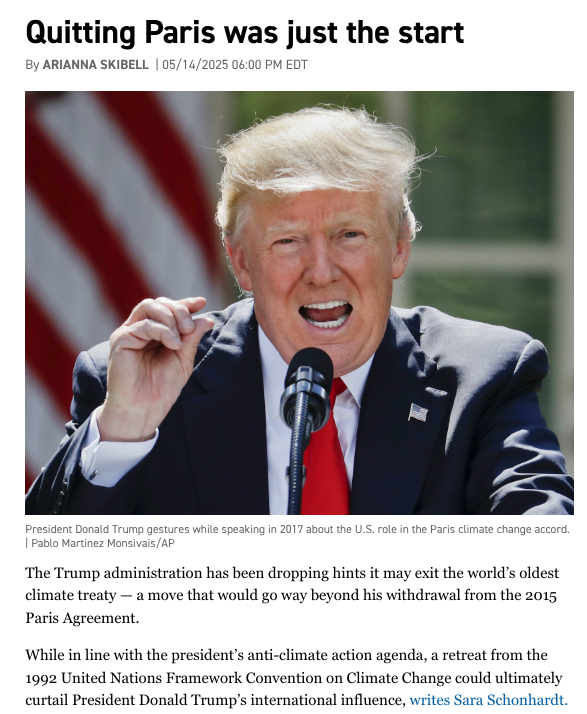Cheers!
This is huge! Trump could end the 30-year-plus UN climate scam once and for all for the USA! https://t.co/0mnvqi3rv6 pic.twitter.com/gvEClGqxaP
— Marc Morano (@ClimateDepot) May 14, 2025
The Trump administration has been dropping hints it may exit the world’s oldest climate treaty — a move that would go way beyond his withdrawal from the 2015 Paris Agreement.
While in line with the president’s anti-climate action agenda, a retreat from the 1992 United Nations Framework Convention on Climate Change could ultimately curtail President Donald Trump’s international influence, writes Sara Schonhardt.
“If we pull out, then we essentially yield the field to anti-fossil-fuel interests,” George David Banks, who led international climate policy in the first Trump White House, told Sara.
During his first term, Trump declined to exit the UNFCCC, which the Democratic-led Senate had ratified during George H.W. Bush’s presidency following the “Earth Summit” in Rio de Janeiro. The treaty’s nearly 200 nations meet annually to chart paths for phasing down planet-warming pollution. One of those gatherings produced the Paris accord, which Trump has exited twice.
But the Trump administration has offered clues it may take a more aggressive approach this time. For starters, it failed to submit an annual inventory of the nation’s greenhouse gases to the U.N. by April 15 — violating a key obligation of the treaty for the first time ever.
Then, Secretary of State Marco Rubio announced he would eliminate the Office of Global Change, which oversees the country’s participation in the U.N.’s annual climate conferences.
“This president inherited 30 years of foreign policy that was built around what was good for the world,” Rubio told reporters at a Cabinet meeting last month. “Under President Trump, we’re making a foreign policy now that’s, what is it good for: America.”
And finally, the Environmental Protection Agency indicated it would shutter its greenhouse gas reporting program, which provides the necessary data to the emissions inventory.
“It’s completely scorched earth,” said Daniel Reifsnyder, who ran the now-axed Office of Global Change when the climate treaty was ratified. “Submitting an emissions inventory is the basic requirement. And if you don’t do that, how can you say you’re taking part in the global response?”
If Trump does pull the country out of the framework, it could be difficult for a new president to undo. Joining a treaty requires a two-thirds Senate vote — a high hurdle even in less polarized times — though some legal scholars say a new administration could rely on the 1992 Senate vote.
Trump has made it clear that his administration isn’t interested in curbing the pollution driving catastrophic climate change. But experts warned that formally exiting the treaty, or effectively quitting it by failing to comply with its basic principles, comes with other risks.
“That means that the rest of the world is going to figure out the direction they want to go in, and we’re not going to be part of that conversation, and we’re not going to be shaping that conversation as the U.S. government,” said Kate Guy, who served as a senior adviser to climate envoy John Kerry under former President Joe Biden.


